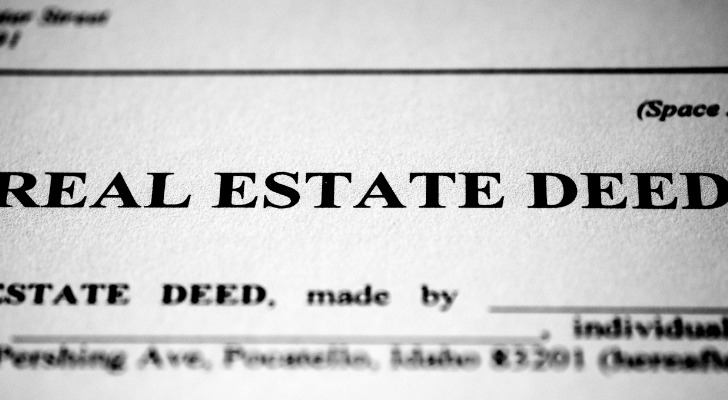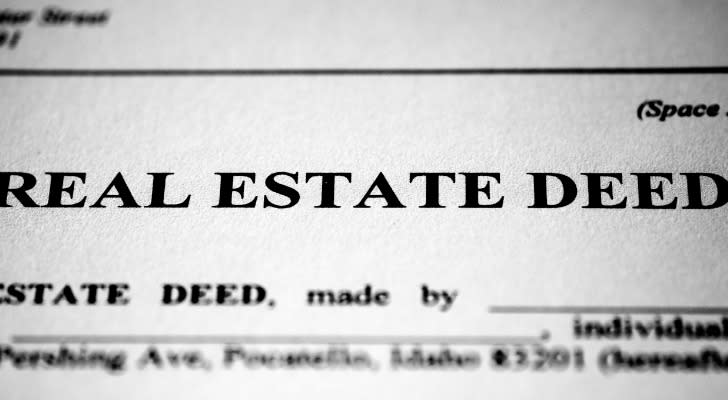
[ad_1]

Property deeds are not just pieces of paper – they hold the power to impact your fiscal situation considerably. Property deeds are legal documents that provide proof of ownership. When you extend ownership rights by adding someone to your property deed, there are tax implications and potential risks associated with the transaction.
A financial advisor can help you make important financial decisions. Find a fiduciary advisor today.
What Are the Tax Consequences of Being Added to a Deed?
A person may be added to a property deed as a result of inheritance, marriage or partnership. It’s crucial to understand that adding someone to a deed typically involves a transfer of ownership interest in the property. With that transfer comes potential tax consequences.
However, when you’re added to a property deed, you may be eligible for certain property tax exemptions or deductions, especially if the property qualifies as your primary residence. These exemptions can vary by location and are worth exploring with your local tax authorities.
But there can also be capital gains tax consequences when the property is eventually sold. The tax treatment depends on factors such as the duration of ownership and changes in the property’s value. It’s essential to keep detailed records of the property’s cost basis and any improvements made to calculate capital gains accurately.
How to Transfer Ownership of a Property

Transferring ownership of a property is a significant legal and financial transaction that requires careful consideration and adherence to specific procedures.
One of the initial steps is conducting a title search. This confirms the current owner and checks for any existing liens or encumbrances on the property. Clearing any outstanding issues is vital to ensure a smooth transfer.
Next, both parties must agree on the terms of the transfer. This includes the sale price, the timeline for the transfer and any contingencies, such as inspections or repairs.
To formalize the agreement, a deed is prepared. This legal document transfers ownership from the current owner (the seller) to the new owner (the buyer). It must be signed in the presence of a notary public and then filed with the appropriate government authority.
Before the transfer is complete, property taxes and any outstanding dues must be settled. Additionally, homeowners’ association fees, if applicable, should be addressed.
Finally, the closing process occurs, during which both parties sign all necessary documents, and the funds are exchanged. Once this is done, ownership is officially transferred, and the new owner can take possession of the property.
Tax Implications of Adding Someone to a Property Deed
It’s important to understand that adding someone to a property deed may not only impact their tax situation but yours as well. By adding another person to a deed, you are essentially gifting them a portion of the property’s value, which may trigger the gift tax. Gift tax is a federal levy on transfers of money or property to another person while getting nothing, or less than full value, in return. The tax applies whether the giver intends the transfer to be a gift or not.
In the United States, there are annual and lifetime gift tax exemptions, which can help reduce or eliminate your gift tax liability. In 2023, the IRS permits you to give up to $17,000 of property per person per year. Individual gifts that exceed this limit count against a person’s lifetime exemption limit, which is currently $12.92 million. Once this lifetime cap is surpassed, you’ll have to pay the federal gift tax, with rates ranging from 18% to 40%.
Additionally, property taxes might be affected as well. Local tax authorities often reassess property values when changes to the deed occur, which could result in higher property taxes.
Potential Risks of Adding a Child to Your Home Deed
Adding a child to your home deed is a significant decision with potential benefits but also several risks, including financial entanglement. When you add someone to your home’s deed, they gain legal ownership rights. If they face financial difficulties, their creditors might place a lien on your property. Moreover, if your child goes through a divorce, their spouse could claim a share of your home.
The aforementioned tax implications are another concern. As mentioned earlier, transferring ownership can trigger gift tax or capital gains tax (if the transfer involves a sale). Estate planning complications may also arise. If you decide to sell your home, your child’s share could affect your eligibility for certain tax exemptions, such as the primary residence exclusion. Additionally, if you have multiple children, disputes over property distribution might arise after your passing.
Finally, there’s the issue of control. Once your child is on the deed, they have a say in property decisions. This could lead to conflicts over maintenance, renovations or even selling the home.
Differences Between Transferring Title and Inheriting Property
Transferring title refers to legally passing ownership of the property from one person to another, often through a deed. In contrast, inheriting property occurs when a property owner dies and their property is passed on to their heirs or beneficiaries, either through a will or through intestate laws if no will exists.
Keep in mind that transferred titles may incur gift taxes or capital gains tax. In contrast, inherited property typically takes on a stepped-up basis, potentially reducing the capital gains tax owed when the property is sold.
Tips for Passing Assets to the Next Generation

The pathway to ensuring smooth sailing during asset transfer involves early planning and the assistance of a financial advisor or estate planning attorney. Start by crafting a well-thought-out estate plan that includes a will, trusts and powers of attorney.
But life is dynamic, so your estate plan should be too. Regularly revisit and update your plan to reflect changes in your financial situation, family structure and relevant laws.
Open and honest communication with your heirs is also essential. Discuss your wishes and the rationale behind your decisions to avoid surprises and potential disputes.
When it comes to tax mitigation, giving assets away while you’re still alive can have a significant impact, especially for the wealthy. That’s because gifting assets during your lifetime can reduce your estate’s taxable value and provide financial support when your heirs may need it most.
Trusts can also help you minimize estate taxes while protecting your assets from creditors and granting you a level of control over how your assets are distributed to the next generation.
Bottom Line
Adding someone else to a property deed or having yourself added to one can have several benefits, including simplified inheritance and shared ownership. However, it’s essential to be aware of the tax implications. Understanding the potential gift, capital gains, property and estate tax consequences will help you make informed decisions regarding your real estate assets.
Home Buying Tips
-
Whether you’re setting out to buy your first home or purchasing a second or third property, understanding the limits of your budget is key. SmartAsset has a tool designed to help you determine how much house you can afford.
-
A financial advisor can be a valuable resource during the home-buying process. Finding a financial advisor doesn’t have to be hard. SmartAsset’s free tool matches you with up to three vetted financial advisors who serve your area, and you can have a free introductory call with your advisor matches to decide which one you feel is right for you. If you’re ready to find an advisor who can help you achieve your financial goals, get started now.
Photo credit: ©iStock.com/eric1513, ©iStock.com/eyecrave productions, ©iStock.com/andresr
The post What Are the Tax Consequences of Being Added to a Deed? appeared first on SmartReads by SmartAsset.
[ad_2]